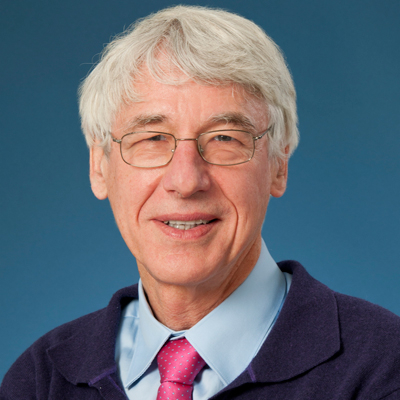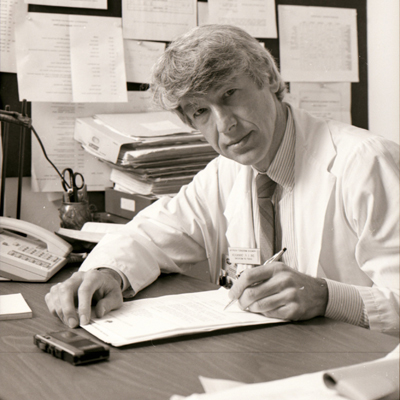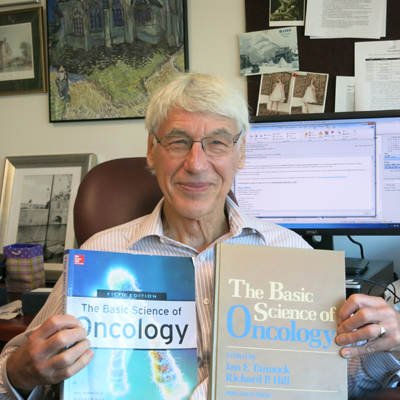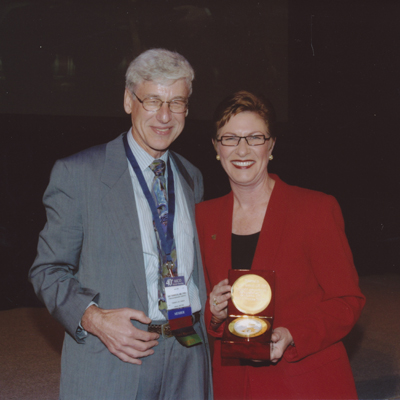
Dr. Ian Tannock became a medical oncology resident at the 'old' Princess Margaret Hospital in 1976. This June, he'll retire after 40 years. (Photo: UHN Photographics)
Forty years ago, a bright-eyed United Kingdom native, Dr. Ian Tannock, began his internship in internal medicine at Toronto General Hospital. In 1976, he became a medical oncology resident at the 'old' Princess Margaret Hospital at 500 Sherbourne street. Two years later, he came on-board as a full-time staff physician – and apart from a one-year sabbatical in Lyon, France – he's been here ever since.
Fast-forward 36 years: Tannock will leave a legacy of world firsts, research excellence and unparalleled mentorship at the Princess Margaret Cancer Centre as he retires this June.
Landing on Canadian soil
Tannock, born Nov. 22, 1943 in Hatfield, Hertfordshire, England, lived in Britain and the United States before settling in Toronto.
Married to an expert in learning disabilities and attention deficit disorder, his wife, Dr. Rosemary Tannock, is a professor at the University of Toronto and senior scientist at SickKids. The couple has three children – Stuart, Lisa and Steven – who have all grown and long flown the nest.
Tannock had his first taste of the Great White North when he landed in Montreal in December 1969, on his way to a Postdoctoral Fellowship position at MD Anderson Hospital in Houston, Texas. He was invited to give lectures about his PhD and travelled on a Greyhound bus, making stops in Kingston, Toronto and London, as well as several places in the United States.
"At that time, the ticket was $99 for 99 days," remembered Tannock with a laugh. "But three weeks was more than enough given bus stations and nearby hotels don't tend to be in the most pleasant parts of cities!"
Long-time colleague and friend, Dr. Richard Hill, Senior Scientist at the Princess Margaret, recalls meeting Tannock during this road trip.
"I have known Ian since 1969 when he visited Toronto on his way to MD Anderson Hospital in Houston," said Hill. "We subsequently linked up again when he returned to Toronto for his medical oncology training and our families have been close friends ever since."
Mel Giovinazzo, administrative assistant to Tannock since 1994, has been part of his journey at the cancer centre for almost 20 years.
"I was very nervous when I first started – he was the Chief of Medical Oncology at the time," remembered Giovinazzo. "But he made it so easy to work with him – in 20 years, I can't think of any time he wasn't respectful and kind."

Tannock works at his desk in the late '70s at the 'old' Princess Margaret Hospital. (UHN Photographics)
Tannock remembers the early years at the Princess Margaret. He treated patients with breast and head and neck cancers in the Medical Oncology department, and after doing an elective with long-time friend and colleague Dr. Michael Jewett on the urology service at the old Wellesley Hospital, he established a new clinic to treat bladder and prostate cancers.
Tannock didn't know it then, but he would go on to develop treatments for prostate cancer leading to the approval of drugs used across the globe.
"When he decides to do something, he delivers the best quality product on time," said Dr. Mary Gospodarowicz, Medical Director at the Princess Margaret. "He is the best mentor of young researchers. Most of his trainees have been immensely successful and remain life-long 'Tannock disciples'."
World first: chemotherapy approved for prostate cancer
In the 1990s, Tannock led an international study to determine whether chemotherapy could improve symptom control and quality of life in patients with incurable prostate cancer. Up to this point, no chemotherapy drug had been approved for prostate cancer, but mitoxantrone was approved by the FDA in 1996 based on the Canadian study he led.
In 2004, Tannock published the results of a second study he chaired in
The New England Journal of Medicine. This study showed the drug docetaxel improved both survival and symptom control for men with hormone-resistant metastatic prostate cancer.
"His research is diverse and he is not afraid to tackle the controversial subjects that others avoid," said Gospodarowicz. "His papers have become classics."
To this day, Tannock's recommendation of docetaxel every three weeks with daily prednisone remains the gold standard of treatment for patients with incurable prostate cancer.
'Cancer of the big toe'
Throughout his career, Tannock has worked to improve the quality and reporting of clinical trials in an effort to make their findings more valid.
In the late '80s, he and his colleagues setup a report of a fictional clinical trial, called "cancer of the big toe".
"While it led to a lot of humour, our imaginary study pointed out many of the errors found in high-impact journals," said Tannock.
More recently, with his current clinical research fellow, Dr. Francisco (Paco) Vera-Badillo, he's looked at breast cancer trials over the past 10 years – how often they're reported appropriately versus how often trials are biased to appear positive.
"I met Dr. Ian Tannock, when I came as an observer in 2007. There are no words to describe him. He has a personality that impacts young trainees and fellows," said Vera-Badillo. "The best decision of my professional life has been asking him to become my mentor. I feel very proud to be his last fellow."
In 2012, their work was published in
Annals of Oncology – the paper was called
"Bias in reporting of end points in efficacy and toxicity in randomized, clinical trials for women with breast cancer". This paper received substantial international publicity, including
an interview with Anna Maria Tremonti on CBC's The Current.

Tannock poses with the first edition of 'The Basic Science of Oncology', co-authored by Dr. Richard Hill in 1987, and the fifth edition, published in 2013. (Photo: UHN)
The 'Bible' for Oncology
Tannock has worked diligently to improve the training of young oncologists at the Princess Margaret and around the world.
In 1987, Tannock and Hill co-wrote and published the first edition of
The Basic Science of Oncology, which Dr. Robert Bell, former CEO and President, UHN, and current Deputy Health Minister of Ontario, coined the
'Bible' for Oncology in 2013.
"The fifth edition was published last year and the editors now include Dr. Robert Bristow and Dr. Lea Harrington, a current and former member of the Princess Margaret faculty," said Hill. "But for 'tracked changes', Ian would certainly have used up more than one pencil on this edition.
Plus ca change, plus c'est la meme chose, is an excellent motto for Ian – the demand for excellence is built-in."
"It has been my pleasure and honour to be an early-on, 'Tannock mentee'. He is now a friend, scientific colleague and sage editor of
The Basic Science of Oncology," said Bristow, clinician-scientist at the Princess Margaret.
With worldwide reach and translations in Japanese, Italian and Greek, close to 20,000 copies of the celebrated text have been sold. The book is used every year by incoming medical and radiation oncology residents at the Princess Margaret.
"Dr. Tannock has been a wonderful mentor and role model over many years. My first experience as a summer medical student under his research supervision inspired me to pursue a career in medical oncology," said Dr. Phil Bedard, medical oncologist at the Princess Margaret. "His impact on many generations of oncologists at the Princess Margaret and beyond will continue to endure long after his retirement."
The man behind the science
While Tannock has a 'serious job', he doesn't take himself too seriously, explains Giovinazzo.
"What strikes me about Ian is that he's so humble about the impact he has on his environment – and what some people might not know about him is how giving he is," she said. "Fellows come from all over the world – and some of them don't have any family here. Ian is always very giving of his home – he always tries to make them feel welcome."
In addition to his kindness, Tannock also maintains a crafty sense of humour.
"My wife and I joined Ian for a meal in Lyon, France. I wanted something the locals would order," said Dr. David Warr, medical oncologist at the Princess Margaret. "Ian suggested andouillette. 'It's a sausage,' he said. When my entrée arrived, I looked at it and sniffed that foul dish. I exclaimed, 'That is pig intestines!' Ian smiled and said, 'I don't care for andouilette'. In revenge, I had the pleasure of roasting him on his 60th birthday."
"When travelling to Rome, Ian and Rosemary lent us their own travel books. We were embarrassed to return them as a rainstorm fully destroyed the books when in a knapsack! Ian's reply: 'Fantastic! They are even better that way!'" said Bristow.
He'll also be greatly missed by his colleagues.
"Ian embodies the true spirit of the Princess Margaret – he is kind and generous with patients and colleagues, mixed with a commitment to excellence and a desire to improve the health of cancer patients," said Dr. Malcolm Moore, Head of Medical Oncology and Hematology at the Princess Margaret. "In my present role as head of Medical Oncology, Ian has consistently been one of our most productive researchers, and at the same time, always willing to do whatever is best for the division and program. On a personal note, I will miss him and wish him well in his retirement."
"There are many special things about Ian, but what I have loved most about working with him is his enthusiasm for the craft of research and the thrill of the results," said Dr. Monika Krzyzanowska, medical oncologist at the Princess Margaret. "He has never lost his curiosity for asking provocative questions and always trying to push the field forward."

Tannock stands with former President of the American Society of Clinical Oncology (ASCO), Margaret Tempero, at the 40th ASCO Annual Meeting held at the Ernest N. Morial Convention Center in New Orleans, LA. (Photo: UHN Photographics)
Leaving a legacy: 'keep asking questions'
Tannock has received many awards throughout his robust career, including an Honorary Degree from London University, United Kingdom. He was one of five recipients to receive the degree as part of the 100th anniversary celebration year of the Institute of Cancer Research (ICR).
In 2012, he received the
ESMO Award (European Society of Medical Oncology), which is given to an ESMO member making outstanding contributions to the development of oncology worldwide. It was the first time this award was given to a non-European.
On Dec.30, 2013,
Tannock was named to the Order of Canada, the country's highest civilian honour, which recognizes outstanding achievement, dedication to the community and service to the nation.
Tannock plans on continuing his legacy long after his retirement, especially when it comes to teaching. He'll travel to different countries this fall to teach, including stops in Singapore, Vietnam, Argentina and Romania.
As for the Princess Margaret, Tannock will especially miss the friendly faces.
"I can't think of anyone I wouldn't get a smile from!" said Tannock. "I'll really miss the people I work with."
"My parting words for the next generation: always be ready to ask for advice, no matter how senior you are," said Tannock. "And always keep constructively critical of what you read in the literature."
Dr. Ian Tannock has made a substantial personal donation to establish the Ian Tannock Fellowship Fund at the Princess Margaret. If you would like to honour his legacy of excellence in teaching and mentorship with a donation, please click here.
